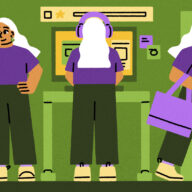The role of the manager has evolved dramatically since the days of barking orders and closed doors. But with modern managers being tasked with managing productivity, morale, and development… are we asking too much? Today’s debate digs into how responsible managers should be for the emotional wellbeing of their team members.
Arguing in favor of managers taking on this emotional labor is debater Eli Mishkin, joined by workplace wellness consultant Laura Putnam who shares just how much your manager already affects your wellbeing… and even your heart health! Debating against this responsibility is Marshall Walker Lee with support from Dr. Mahreen Khan, a Senior Researcher in the People Insights Team at Atlassian, who explains the risks of putting too much on managers.
Episode References
- SHRM: Tips for managers emotionally supporting employee (featuring guest Laura Putnam): https://www.shrm.org/resourcesandtools/hr-topics/people-managers/pages/emotions-at-work-.aspx
- Gallup: Study about managers outsized role in employee engagement: https://news.gallup.com/businessjournal/182792/managers-account-variance-employee-engagement.aspx
- Ask a Manager: “Our boss pushes us to share how we’re doing emotionally at team meetings”
https://www.askamanager.org/2020/05/our-boss-pushes-us-to-share-how-were-doing-emotionally-at-team-meetings.html - Paychex: “Mental health at work during COVID 19” https://www.paychex.com/articles/human-resources/mental-health-at-work-during-covid19
- Laura Putnam: “Make workplace wellness work” https://chiefexecutive.net/how-you-can-make-workplace-wellness-work/
- Karolinska Institute research on heart health and managers: https://pubmed.ncbi.nlm.nih.gov/19039097/#affiliation-1
Transcript
Christine Dela Rosa:
Welcome to Work Check, an original podcast from Atlassian, where we take everyday workplace practices and debate if they’re actually working for us. Today, we’re asking, should your manager be responsible for your emotional wellbeing? I’m your host, Christine Dela Rosa, who has legit asked this question both when I was a manager and as a direct report. Not naming names or specific situations, but know that this one’s very relevant for me.
Marshall Walker Lee:
Oh, come on. Give us the dirt.
Christine Dela Rosa:
Uuum, no. Arguing in favor of managers being responsible for their team’s emotional wellbeing, we have Eli Mishkin.
Eli Mishkin:
Hello.
Christine Dela Rosa:
Eli is such a caretaker, he still takes care of the office plants from his last job.
Marshall Walker Lee:
Whoa.
Eli Mishkin:
What can I say? I’m a nurturing kind of guy.
Christine Dela Rosa:
And debating Eli today, arguing managers should not be responsible for employees’ emotional wellbeing, we have Marshall Walker Lee, who tells me he also loves plants.
Marshall Walker Lee:
Yes, Christine. But unlike Eli, I encourage my plants to take care of themselves…Which might explain why I keep killing my plants.
Christine Dela Rosa:
All right. All right. As we always do, let’s begin with the pro side. So Eli, start us off. Why should your manager be responsible for your emotional wellbeing?
Eli Mishkin:
All right, let’s begin. I want to start with my first argument, what I think should be the obvious point here.
Marshall Walker Lee:
All right. I’m listening.
Eli Mishkin:
It doesn’t matter if your manager should or should not be responsible for your emotional wellbeing because they already are.
Marshall Walker Lee:
Oh, dun-dun-dun.
Eli Mishkin:
Whether your manager knows it or not, whether you know it or not, your manager already has an outsized impact on your emotional wellbeing.
Marshall Walker Lee:
Hmm.
Eli Mishkin:
So quick question for you. Marshall, Christine, think of your best workplace experience.
Marshall Walker Lee:
Okay.
Eli Mishkin:
How was your manager a part of that? Now think of your worst workplace experience. How was your manager a part of that?
Marshall Walker Lee:
I see what you’re doing Eli.
Eli Mishkin:
Ah, then you’ll see that our debate is over.
Eli Mishkin:
Not really, not really. But I want to share an experience about one of my past managers that makes this point. After a really long weekend which involved a pretty sad and long relationship breakup, I sat down at my desk. My manager came in to say hi, and she took one good look at me and just knew. She said, “Eli, it looks like you could use some time away from the office. Go ahead, go home. I don’t need to know what’s going on. You can tell me if you want, but we’re good here.” She could just tell that I was off. All of this just by tuning into me, just by being there and kind of noticing.
Christine Dela Rosa:
That’s so awesome.
Eli Mishkin:
Yeah. Her actions alone made me feel safe and supported at the job. So to prepare for today’s debate, I chatted with Laura Putnam, a workplace wellness consultant. She’s the CEO of Motion Infusion and the author of the book, “Workplace Wellness That Works.”
Laura Putnam:
I think whether or not managers are aware of it or not, just because of their role as a manager, they are uniquely positioned within the organization to either persuade or dissuade their team members to engage with their wellbeing. And while it certainly is well known that people don’t leave their job, they leave their boss by and large, there’s also some frightening research showing that when it comes to the health of our heart, our boss matters more than our doctor does.
Laura Putnam:
And so when we hear people joking about how their boss is killing them, they actually kind of mean it. This study that came out of the Karolinska Institute in Sweden found that if we have a negative boss, our risk of having a heart attack goes up, not only right now, but 10 years out. So again, those managers, whether or not they personally prioritize wellbeing, they really have an outsized role around safeguarding the wellbeing of their team members.
Eli Mishkin:
So Laura tells me there’s research from Gallup that says a manager alone accounts for up to 70% of an employee’s engagement with their work.
Christine Dela Rosa:
Whoa.
Eli Mishkin:
I think sometimes we assume that emotional wellbeing comes from the larger structures at an organization, like the senior leadership, the HR department, but in Laura’s experience, it’s mostly the manager. She said she sees them as the “permission givers” who influence the big, the small and everything in between in an employee’s day.
Laura Putnam:
As an individual team member, do I feel like I have permission to take a short break? Well, I’m going to be looking to my manager for that. Do I feel like I have permission to be able to share that I am really having a hard time with my mental health? If I’m a manager and during a team meeting I’m multitasking, there’s a study showing that your team members are going to do the same thing, or if you’re a manager and you send late night emails, your team members are likely going to do the same thing. So while you might have company-wide programs that are, for example, telling people to turn off their devices at night, those can’t stand up to the messages and the signals that are being sent by the manager within the context of the team.
Eli Mishkin:
And I would even suggest that when managers spend more time thinking about ways to create and model emotional wellbeing, not only do their employees you feel better, guess who else benefits?
Christine Dela Rosa:
They do?
Eli Mishkin:
Yes, they do. The managers. Being responsible for the emotional wellbeing of others forces managers to prioritize their own emotional wellbeing as well. It’s a net good. So there you go. For me, there’s no debate here. It is not about whether or not your managers should be responsible for your emotional wellbeing, because they already are. They’re the biggest factor. The question is then, are they going to step up to that role and have a positive impact or ignore their role and potentially harm their team’s wellbeing?
Christine Dela Rosa:
Debate side, Eli, I really like the exercise of just thinking about all the times we’ve had high and low moments and how influential my manager has been each of those instances. Marshall, how do you respond? Why shouldn’t managers be responsible for your emotional wellbeing? Or to Eli’s point, why aren’t they already?
Marshall Walker Lee:
Yeah, this is going to be very interesting, Christine, because I actually agree with Eli that there’s really nothing to debate today. But I think that’s because it’s so self evidently obvious that managers cannot and should not be held responsible for anybody’s emotions, especially their own employees.
Christine Dela Rosa:
Ooh, can’t wait!
Marshall Walker Lee:
All right. So let’s dig in. Now I want to start by laying my own philosophical cards on the table. I firmly believe that no one is responsible for anyone else’s emotional wellbeing. But for the sake of argument, let’s assume that it is possible for someone else, in this case your manager, to be responsible for your feelings and emotions. The implication here is that your manager can control your emotions. Otherwise, how could we possibly hold them responsible for them?
Marshall Walker Lee:
And isn’t this an incredibly disempowering message to send to employees? Does anybody actually want to live in a world where our managers own the responsibility for our emotions as though our inner life was an OKR? I mean, personally, as a manager, I know from experience I can’t control the emotions of my team members. I want them to feel good, absolutely.
Christine Dela Rosa:
Of course.
Marshall Walker Lee:
And I try to make space for whatever emotions they might be experiencing, good or bad. But I know that where feelings are concerned, my influence is actually pretty limited. This is probably a good time to point out that in my opinion, I think it is impossible to separate our work lives and our personal lives where emotions are concerned.
Marshall Walker Lee:
If your pet dies, if you’re getting divorced, if your children are sick, you’re probably going to be feeling bad and that might affect your work. But your boss can’t fix any of that. And I think that the most obvious sign that something is wrong with this idea that managers would be responsible for our emotions is that we don’t apply this principle to any other relationship in our lives. When we’re thinking about our spouses or our siblings or our friends, we don’t think that we can manage their emotions or vice versa. Right?
Christine Dela Rosa:
Yeah.
Marshall Walker Lee:
Now a great boss can and should create space for their employees to be authentic and honest and fully present. And I think we should expect that everybody will have both positive and negative feelings and those might impact their work. But I don’t think we want to establish a power dynamic where managers are expected to deliver emotional outcomes like they would deliver a project. In my opinion, that can only hurt employees.
Christine Dela Rosa:
I really like that framing there, Marshall. I sometimes think about, “oh, this thing influenced me or this event or this person or this experience,” but at the end of the day, I’m making my own choices and my own decisions. And I think it’s really good to remember, not just for this debate, but just in life. Eli, what are you thinking?
Eli Mishkin:
Oh you know, thinking about life. But also thinking about what a manager’s job is.
Christine Dela Rosa:
Nice transition.
Eli Mishkin:
Thanks. Now even the most basic job description of a manager includes being responsible for the team’s productivity. We can all agree on that, yeah?
Marshall Walker Lee:
Yeah. I suppose so.
Eli Mishkin:
Great. I’m so glad we have unified agreement. And by the end of my argument, we’ll also all agree that wellbeing is deeply tied to the productivity of those team members. We do our best work when we feel our best. So not to get to Brené Brown on you, but to quote Brené Brown to you…
Eli Mishkin:
She writes in Dare to Lead that “Leaders must either invest a reasonable amount of time attending the fears and feelings, or squander an unreasonable amount of time trying to manage ineffective and unproductive behavior.” It’s unproductive to ignore the emotional health of employees. Emotional wellbeing is not just a fluffy nice to have, it’s actually key to employee and company performance. And since work life and life life don’t have tidy boundaries, the potential for being a good performer is directly tied to how supported you feel by your manager. People have been studying this link between wellbeing and productivity since the 80s and 90s, and those decades of research show that wellbeing is linked to better employee engagement, better retention, even profitability. Happy employees are more productive employees.
Eli Mishkin:
I’ve seen this in my own life. Back to my favorite past manager example – when she made space for me to be me wherever I was at emotionally, I was more likely to find my equilibrium and I jumped back into work. I took the day off, I had a good think and I came back the next day more focused on my priorities, my tasks, my deadlines, plus I was more enjoyable to be around as a human. And her being responsible for my emotional wellbeing made me want to be a more productive member of the team. There was a direct link there.
Christine Dela Rosa:
Yeah. Great point there, Eli. It’s not just about how we’re feeling, but it goes back to what managers care about, which is their team performance. I hear ya. Marshall, what do you have?
Marshall Walker Lee:
Yeah, so I do agree that there is a strong connection between productivity and wellbeing. And I do think Eli, it’s unproductive to ignore your team’s feelings if they’re really struggling. I would hope that basic decency would compel a manager to lean in if one of their employees is overwhelmed or scared or anxious.
Christine Dela Rosa:
Good point.
Marshall Walker Lee:
It feels like a lot of what you were describing, Eli, in your personal anecdotes about your own old manager is emotional table stakes. To me, it sounds like your manager was a good person, not necessarily that they were responsible for your feelings. I think that if we set managers up to be responsible for their team’s emotional wellbeing, this will actually have a negative impact on productivity and performance, especially for the managers themselves. To explain why I want to bring in my guest, Mahreen Khan. She’s a senior researcher right here at Atlassian on the people insights team. And she thinks that in an ideal world, a manager would be able to support their employees on all these emotional levels. But in practice, this poses a lot of challenges.
Mahreen Khan:
We found that with our internal Atlassian research, a lot of the time managers compared to individual contributors can sometimes experience higher levels of stress in their jobs. Managers are not just managers. They’re not just responsible for the people under them. They also have a lot of responsibilities in terms of providing work to the people that they work for. So they’re experiencing pressure in terms of supporting their employees, but they’ve also got directives from the top down.
Marshall Walker Lee:
And adding to those responsibilities can sometimes be too much for managers.
Mahreen Khan:
What can also happen is when somebody takes on too much of that emotionally supportive role, they might actually experience compassion fatigue, which means that they’re actually more likely to burn out as a result of simply hearing about other people’s experiences. So it’s definitely something that we see a lot at Atlassian where we have seen managers speak up about the challenges that’s required in emotionally supporting their team because they tend to experience a secondhand effect on themselves as well. And given all of the demands that managers are already facing, the added pressure of expecting managers to support the emotional wellbeing of their employees might be a bit too much. In our research, we’ve also found that this added pressure may even be impacting managers’ intentions to stay in their current jobs.
Marshall Walker Lee:
Managers are already overwhelmed, so why are we adding new tasks to their job description? Frankly, I can’t think of anything worse for team productivity than a manager getting burnt out and quitting their job.
Eli Mishkin:
Fair.
Marshall Walker Lee:
And what if they don’t quit? What if instead they decide to stick it out and try to muscle through this very difficult new responsibility that’s been added to their plate? Who’s responsible for their emotional wellbeing?
Christine Dela Rosa:
Yeah.
Marshall Walker Lee:
Their manager? Is it just turtles all the way down? Eventually we run out of people to pass the emotional buck to. And the only way to break this chain is for each individual to be responsible for their own feelings, for their own emotional wellbeing.
Christine Dela Rosa:
Totally.
Marshall Walker Lee:
And all of that presupposes that these managers are even equipped to take on this responsibility in the first place.
Christine Dela Rosa:
Yep.
Marshall Walker Lee:
Here’s Mahreen again.
Mahreen Khan:
Being able to support emotional wellbeing is actually really a specialized skillset. And to be quite frank, not all managers actually have this ability and this might actually create a worse situation for the employee that’s in need, especially if the manager does not know how to deal with that situation. If the manager unintentionally says something that is invalidating or is not supportive to their employee’s experience, you are left with a situation where employees can be quite disgruntled and they might end up in a situation where they eventually want to leave their organization.
Marshall Walker Lee:
So there are people who are equipped to do this work: HR professionals, counselors. And this is why we are seeing more companies hiring chief wellbeing officers, or folks with similar titles. There’s real value in these skills. They’re not just skills we should expect every average manager to have.
Marshall Walker Lee:
Here’s the bottom line for me. It might be a nice idea to imagine a world in which managers can actively shape or guide the feelings of their teams, especially during difficult periods, like say hypothetically, a global pandemic that reshapes how we work and live and structure our lives.
Eli Mishkin:
Hypothetical.
Marshall Walker Lee:
Hypothetically. But in reality, I think that asking this of managers will harm them, harm their employees and harm our teams.
Christine Dela Rosa:
Marshall, wow. I have been thinking about this debate in terms of the impact on an employee, on the direct report. But you really turned it around for me to make the subject of the debate about the managers, even though I know the term managers is in the debate question. I wasn’t even thinking about who watches the watchers?
Marshall Walker Lee:
Exactly.
Christine Dela Rosa:
Watchmen fans out there? Yes! I got one after all these debates. Eli, how do you respond to Marshall’s idea that managers just aren’t able to take this new task on?
Eli Mishkin:
There’s a couple of thoughts. First off, managers don’t need to be experts at caring for emotional wellbeing. This is not about them becoming therapists or psychologists. This is just about being empathetic humans. There are very simple, tangible things a manager can do to influence wellbeing. Model good habits like logging off at night, taking a break, sharing their own struggles, checking in, creating space for their team to share. Marshall, you argue that managers are overburdened – and that’s probably true. And if that’s the case, I propose we need to take other stuff off of their plates, because this is the most important role of a manager. Through their actions alone, they make or break the company culture their team experiences. Marshall, let me ask, do you know the secret to good yogurt?
Marshall Walker Lee:
Strawberry jam.
Eli Mishkin:
That’s a good topping, but what actually helps make good yogurt?
Marshall Walker Lee:
Bacteria.
Eli Mishkin:
Yes. Culture! Starting with good culture is the secret to good yogurt.
Marshall Walker Lee:
How did I not see that coming?
Eli Mishkin:
Want to know the secret to good company culture?
Marshall Walker Lee:
Yogurt.
Eli Mishkin:
Yes. Wait, no. Sort of. It’s emotional wellbeing. Emotional wellbeing is the key to good company culture. If culture is the way that people relate to each other and their work very simply, then wellbeing is the thing that feeds company culture. It’s the yogurt to employee wellness, if you want, or something.
Christine Dela Rosa:
Wow.
Eli Mishkin:
And speaking of culture, the culture has changed. The times have changed. Employees today just expect more of their managers. Nowadays, to be a good manager, you have to understand that employees are human, that work is personal. They understand every employee has the same universal human needs of respect, support, autonomy. When modern managers embody the humanity at the core of their work, they nurture the company culture in tangible and lasting ways.
Christine Dela Rosa:
Great point, Eli. And I agree, there are ways a manager can take responsibility for the emotional health of the team that isn’t the same role as what HR or even a psychologist would play. Just by leading by example or checking in. Great reminder. Marshall, you’re up. How do you counter that idea?
Marshall Walker Lee:
Well, first off, I just have to say as a manager, yes, let’s take stuff off my plate. That sounds great. No debate.
Marshall Walker Lee:
But to address your point about culture, I agree with you that empathy and emotional wellbeing are integral to positive, healthy company cultures. But where I disagree is that I think culture is in an emergent phenomenon. It comes from the bottom up. And when we try to regulate it through top-down structures and responsibilities, oftentimes we produce unexpected, negative consequences.
Marshall Walker Lee:
So for instance, if I felt I was responsible for the emotional wellbeing of my team, I would be incentivized to start nudging them towards more positive emotions and fewer negative emotions, at least when it comes to whatever survey tool or mechanism we’re using to capture all of this data.
Marshall Walker Lee:
Imagine you show up for your first day of work and your new manager says, “Hey, I’m Marshall, I’m your new manager and I’ll be responsible for your emotions so can you please fill out this survey and keep in mind that my performance is judged on your answers?”
Eli Mishkin:
Oof.
Christine Dela Rosa:
I cannot imagine that, no.
Marshall Walker Lee:
So as a manager, I work hard to cultivate real relationships with my team, but if I thought that I was responsible for them feeling good, that might actually make it harder for me to just show up and as you said, be a human. Imagine how complicated it would be for me or any other manager who shows up at a meeting and learns unexpectedly that the employee is going through a serious personal crisis. Perhaps it’s related to work, perhaps it’s not. But now instead of engaging with them just as another human being who cares about them feeling good, who cares about them having less stress, less anxiety, I’m now worrying about, “Oh, shoot, how is this going to show up on my quarterly performance report where they’re going to rank their emotions on a scale of one to 10?”
Eli Mishkin:
I hear all that. But the thing is, it already does show up on your quarterly reports. It’s just through the guise of performance and productivity.
Christine Dela Rosa:
Ohhh!
Eli Mishkin:
If they’re waylaid by something in their personal life, if they can’t focus at work, it does filter up and out through their performance. This is not about gaming the system so that employees are smiling at all times, giving managers five out of five on scores. It’s about letting them work through the range of human emotions that happen to coexist at work.
Marshall Walker Lee:
Hmm. I would be curious to know how a system like that accounts for people who simply have no interest in bringing their emotions to work or no interest in sharing those emotions with their boss. Again, when we set up systems, especially systems that have documented accountability, we incentivize people to be nosy and bossy and to attempt to manipulate other people.
Marshall Walker Lee:
I think there’s also another interesting paradox here. So the American Psychological Association reports that 75% of the workforce writ large says that their boss is this single largest source of stress at their job. So how do you square the circle of employees already feeling stressed about their bosses now having to bring their stress to their bosses?
Eli Mishkin:
Hmm, that’s good. I hadn’t really thought about it like that. But I think an emotionally intelligent manager doesn’t need to know what’s happening in their employees lives and they can still create a safe environment that fosters emotional wellbeing.
Marshall Walker Lee:
Okay, but I can easily imagine a situation where a less emotionally intelligent leader takes this way too far. On Allison Green’s Ask a Manager blog, she published a really interesting letter from someone who wrote in because their boss had started to host mental health sharing sessions at mandatory team standups.
Christine Dela Rosa:
Whoa. Interesting.
Marshall Walker Lee:
And I’m sure that the boss’s intentions were good. But this person who wrote in, they said that they felt pressured to reveal information about their own mental health and their personal life that made them deeply uncomfortable.
Christine Dela Rosa:
Oh no.
Marshall Walker Lee:
And now this meeting was actually the thing that was making their mental health worse. Honestly, not everybody wants to have these conversations at work, especially with their manager.
Marshall Walker Lee:
A recent study from Paychex found that most employees were uncomfortable talking to their boss about mental health generally, and many worried that it would lead to them losing promotions or maybe even getting fired. And I really do agree with Eli that we as managers should be striving to show up at work as human beings and care for our teams. But I think this is a very complex area. We have legal rights to privacy in the workplace, and many people feel uncomfortable sharing their feelings, especially if those feelings might hint at medical or psychological health issues. So I would just strongly prefer that we never use the word responsibility. We do exactly what Eli said. We set people up at work so that they can be empathetic, so that they can be human beings and we leave it at that.
Christine Dela Rosa:
Whew. So many points are rattling around in my head right now. Eli, first of all, you drove home that managers really do have a massive impact on our emotional wellbeing. They drive productivity and really are the way that company culture is enacted on the individual daily level. And Marshall, you brought up some important concerns about, if this strategy really is good for the employees, does it overburden the managers or strain the team relationships?
Christine Dela Rosa:
I personally think managers should feel responsible. They should consider it a part of their job to do everything within their power to make the workplace emotionally healthy. But should it be a formalized duty? No. I think that’s an overreach and in all honesty, I don’t think we’re quite there yet. So because of that, Marshall, you are the winner of today’s debate.
Marshall Walker Lee:
Great. You were responsible for my emotional wellbeing today and now I am feeling good.
Eli Mishkin:
And you are responsible for my emotional wellbeing and now I don’t feel good. See.
Marshall Walker Lee:
Welcome to manager life.
Christine Dela Rosa:
Well, good thing I’m not actually either of your managers, but I really do believe managers should harness the influence they do have to improve wellbeing.
Christine Dela Rosa:
And if you want to improve our wellbeing, help us out: rate, subscribe, visit atlassian.com/workcheck. Until next time folks, this is Work Check, an original podcast from Atlassian.









































